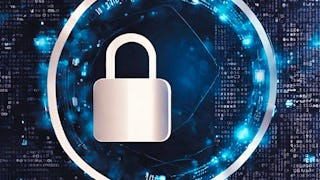Filter by
SubjectRequired
LanguageRequired
The language used throughout the course, in both instruction and assessments.
Learning ProductRequired
LevelRequired
DurationRequired
SkillsRequired
SubtitlesRequired
EducatorRequired
Explore the Criminal Law Course Catalog
 Status: Free Trial
Status: Free TrialSkills you'll gain: Medical Privacy, Information Privacy, Personally Identifiable Information, Law, Regulation, and Compliance, General Data Protection Regulation (GDPR), Legal Risk, Regulation and Legal Compliance, Health Care Procedure and Regulation, Data Governance, Medical Records
 Status: Free Trial
Status: Free TrialDuke University
Skills you'll gain: Large Language Modeling, Data Ethics, Decision Tree Learning, Regression Analysis, Generative AI, Artificial Intelligence, Predictive Modeling, Machine Learning, Applied Machine Learning, Statistical Modeling, Artificial Intelligence and Machine Learning (AI/ML), Python Programming, Natural Language Processing, Image Analysis, Machine Learning Methods, Deep Learning, Visualization (Computer Graphics), Predictive Analytics, Artificial Neural Networks, Algorithms

Universitat de Barcelona
Skills you'll gain: Entrepreneurship, Feasibility Studies, Financial Analysis, Media Production, Market Opportunities, Video Production, Business Planning, Law, Regulation, and Compliance, Business Modeling, New Business Development
 Status: Free
Status: FreeJohns Hopkins University
Skills you'll gain: Legal Strategy, Legal Risk, Family Law, Proactivity, Mediation, Conflict Management, Planning, Communication
 Status: Free Trial
Status: Free TrialEIT Digital
Skills you'll gain: Information Privacy, Medical Privacy, Personally Identifiable Information, Legal Writing, Legal Research, General Data Protection Regulation (GDPR), Law, Regulation, and Compliance, Health Care Procedure and Regulation, Technology Strategies

Emory University
Skills you'll gain: Community Organizing, Social Justice, Social Sciences, Community Development, De-escalation Techniques, Social Studies, Advocacy, Conflict Management, Education and Training, Cultural Responsiveness, Civil Law, Diversity Awareness, Discussion Facilitation, Media and Communications

Tel Aviv University
Skills you'll gain: Cultural Diversity, Diversity Awareness, Immigration Law, Social Justice, Social Sciences, International Relations, World History, Socioeconomics, Culture, Political Sciences, Sociology, Diplomacy, Public History, Economic Development, Demography, Economics, Governance
 Status: Free Trial
Status: Free TrialUniversity of Colorado Boulder
Skills you'll gain: Data Ethics, Security Awareness, Healthcare Ethics, Ethical Standards And Conduct, Computer Security Awareness Training, Cybersecurity, Diversity Awareness, Generative AI, Artificial Intelligence, Information Technology, Medical Privacy, Information Privacy, Media and Communications, Machine Learning, Automation, Cultural Diversity, Personally Identifiable Information, Artificial Intelligence and Machine Learning (AI/ML), Social Justice, Law, Regulation, and Compliance
 Status: Free Trial
Status: Free TrialUniversity of Michigan
Skills you'll gain: Constructive Feedback, Cooperation, Decision Making, Peer Review, Team Performance Management, Team Building, Team Management, Independent Thinking, Personal Development, Empathy, Team Motivation, Self-Awareness, Solution Delivery, Critical Thinking, Teamwork, Mentorship, Growth Mindedness, Supervision, Collaboration, Communication Strategies

Tel Aviv University
Skills you'll gain: Economics, Economics, Policy, and Social Studies, Tax, Economic Development, Social Justice, Socioeconomics, Public Policies, Tax Planning, Policy Analysis, Income Tax

The Hong Kong University of Science and Technology
Skills you'll gain: Market Liquidity, Analysis, Financial Policy, Economics, International Finance, Financial Systems, Financial Market, Financial Regulation, Market Dynamics, Supply And Demand, Forecasting
 Status: Free
Status: FreeJohns Hopkins University
Skills you'll gain: Advocacy, Public Policies, Public Health, Public Safety and National Security, Legal Proceedings, Policy Analysis, Community Organizing, Community Health, Crisis Intervention, Civil Law, Health Policy
Criminal Law learners also search
In summary, here are 10 of our most popular criminal law courses
- Fundamental Privacy Acts and Laws: Infosec
- Explainable AI (XAI): Duke University
- Emprender la emprendeduría: Universitat de Barcelona
- Helping Families Avoid Negative Court Involvement Teach-Out: Johns Hopkins University
- Privacy & Standardisation Capstone: EIT Digital
- From Freedom Rides to Ferguson: Narratives of Nonviolence in the American Civil Rights Movement: Emory University
- The History of Modern Israel - Part II: Challenges of Israel as a sovereign state: Tel Aviv University
- Computing, Ethics, and Society: University of Colorado Boulder
- Feedback Loops: How to Give & Receive High-Quality Feedback: University of Michigan
- Economic Growth and Distributive Justice Part II - Maximize Social Wellbeing: Tel Aviv University










